大专院校常用大学英语教材
- 格式:docx
- 大小:37.15 KB
- 文档页数:2
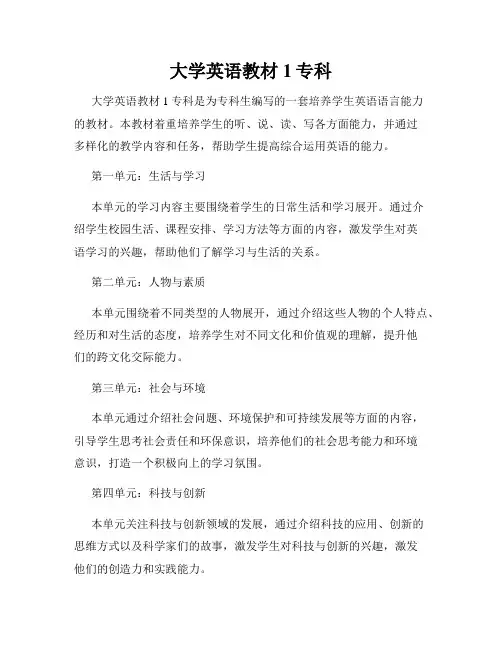
大学英语教材1专科大学英语教材1专科是为专科生编写的一套培养学生英语语言能力的教材。
本教材着重培养学生的听、说、读、写各方面能力,并通过多样化的教学内容和任务,帮助学生提高综合运用英语的能力。
第一单元:生活与学习本单元的学习内容主要围绕着学生的日常生活和学习展开。
通过介绍学生校园生活、课程安排、学习方法等方面的内容,激发学生对英语学习的兴趣,帮助他们了解学习与生活的关系。
第二单元:人物与素质本单元围绕着不同类型的人物展开,通过介绍这些人物的个人特点、经历和对生活的态度,培养学生对不同文化和价值观的理解,提升他们的跨文化交际能力。
第三单元:社会与环境本单元通过介绍社会问题、环境保护和可持续发展等方面的内容,引导学生思考社会责任和环保意识,培养他们的社会思考能力和环境意识,打造一个积极向上的学习氛围。
第四单元:科技与创新本单元关注科技与创新领域的发展,通过介绍科技的应用、创新的思维方式以及科学家们的故事,激发学生对科技与创新的兴趣,激发他们的创造力和实践能力。
第五单元:文化与传统本单元重点介绍不同国家和地区的文化与传统,帮助学生了解和尊重其他国家和地区的文化背景,培养学生的国际视野和文化品味,提高他们的跨文化交际能力。
第六单元:职业与就业本单元介绍就业市场、职业规划、求职技巧等方面的内容,培养学生的职业意识和就业能力,帮助他们顺利转型到社会,并为将来的职业生涯做好准备。
通过以上的单元设置和学习内容,大学英语教材1专科旨在提高学生的英语语言能力、跨文化交际能力和创新实践能力,为他们的学习和未来的发展打下良好的基础。
同时,教材注重培养学生的学习兴趣,通过丰富多样的教学任务和实践活动,帮助学生积极参与课堂,提高学习效果。
希望学生们能够在大学英语教材1专科的学习中体验到英语学习的乐趣,真正掌握英语语言能力,为将来的学习和工作打下坚实的基础。
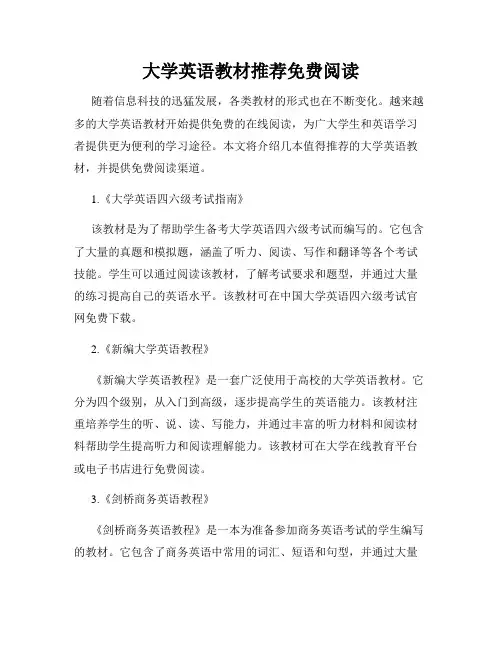
大学英语教材推荐免费阅读随着信息科技的迅猛发展,各类教材的形式也在不断变化。
越来越多的大学英语教材开始提供免费的在线阅读,为广大学生和英语学习者提供更为便利的学习途径。
本文将介绍几本值得推荐的大学英语教材,并提供免费阅读渠道。
1.《大学英语四六级考试指南》该教材是为了帮助学生备考大学英语四六级考试而编写的。
它包含了大量的真题和模拟题,涵盖了听力、阅读、写作和翻译等各个考试技能。
学生可以通过阅读该教材,了解考试要求和题型,并通过大量的练习提高自己的英语水平。
该教材可在中国大学英语四六级考试官网免费下载。
2.《新编大学英语教程》《新编大学英语教程》是一套广泛使用于高校的大学英语教材。
它分为四个级别,从入门到高级,逐步提高学生的英语能力。
该教材注重培养学生的听、说、读、写能力,并通过丰富的听力材料和阅读材料帮助学生提高听力和阅读理解能力。
该教材可在大学在线教育平台或电子书店进行免费阅读。
3.《剑桥商务英语教程》《剑桥商务英语教程》是一本为准备参加商务英语考试的学生编写的教材。
它包含了商务英语中常用的词汇、短语和句型,并通过大量的商务场景模拟对学生进行培训。
该教材可在剑桥大学出版社的官方网站上免费下载。
4.《大学英语教材精读系列》《大学英语教材精读系列》是一套由北大出版社出版的教材。
该系列教材以大学英语教材为基础,选取了重点和难点部分进行详细解读和讲解。
每本教材都提供了大量的例句和练习题,帮助学生加深对教材内容的理解和记忆。
该系列教材可在北大出版社官方网站上免费阅读。
总结:以上是几本值得推荐的大学英语教材,它们涵盖了不同层次和需求的学生。
通过免费阅读这些教材,学生不仅可以提高自己的英语水平,还可以更好地准备各类英语考试。
希望广大学生和英语学习者能够充分利用免费阅读资源,持续提升自己的英语能力。
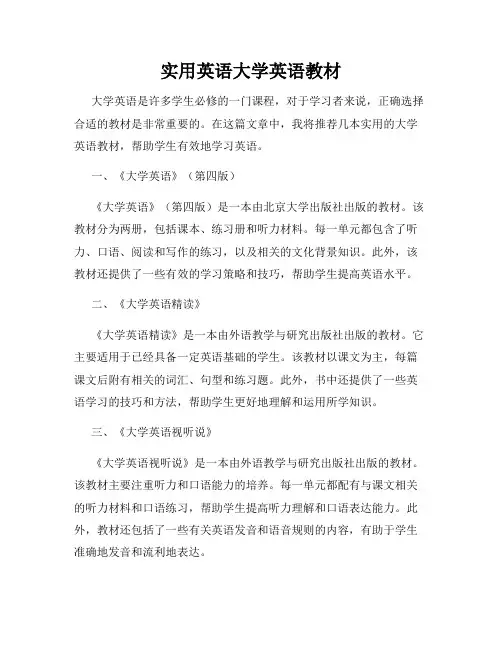
实用英语大学英语教材大学英语是许多学生必修的一门课程,对于学习者来说,正确选择合适的教材是非常重要的。
在这篇文章中,我将推荐几本实用的大学英语教材,帮助学生有效地学习英语。
一、《大学英语》(第四版)《大学英语》(第四版)是一本由北京大学出版社出版的教材。
该教材分为两册,包括课本、练习册和听力材料。
每一单元都包含了听力、口语、阅读和写作的练习,以及相关的文化背景知识。
此外,该教材还提供了一些有效的学习策略和技巧,帮助学生提高英语水平。
二、《大学英语精读》《大学英语精读》是一本由外语教学与研究出版社出版的教材。
它主要适用于已经具备一定英语基础的学生。
该教材以课文为主,每篇课文后附有相关的词汇、句型和练习题。
此外,书中还提供了一些英语学习的技巧和方法,帮助学生更好地理解和运用所学知识。
三、《大学英语视听说》《大学英语视听说》是一本由外语教学与研究出版社出版的教材。
该教材主要注重听力和口语能力的培养。
每一单元都配有与课文相关的听力材料和口语练习,帮助学生提高听力理解和口语表达能力。
此外,教材还包括了一些有关英语发音和语音规则的内容,有助于学生准确地发音和流利地表达。
四、《新编大学英语》《新编大学英语》由外语教学与研究出版社出版,是一本全面的大学英语教材。
该教材内容丰富,涵盖了听力、口语、阅读、写作和翻译等多个方面。
同时,每一单元都配有相关的练习和测评,帮助学生巩固所学知识。
此外,教材还提供了一些丰富多样的阅读材料,包括新闻报道、科技文章等,培养学生的阅读能力。
总结起来,以上几本教材都是非常实用的大学英语教材,可以根据自己的英语水平和学习需求进行选择。
同时,与教材配套的课后练习和听力材料也是提高英语能力的有效工具。
希望学生们能够根据自身情况,选择适合自己的教材,并结合实际情况制定学习计划,不断提高英语水平。
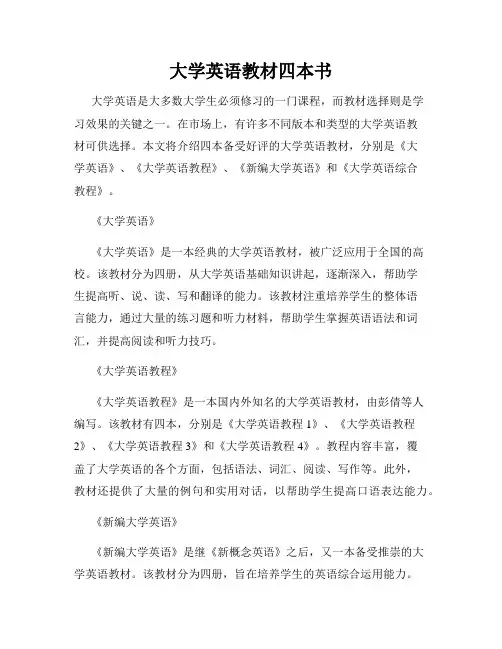
大学英语教材四本书大学英语是大多数大学生必须修习的一门课程,而教材选择则是学习效果的关键之一。
在市场上,有许多不同版本和类型的大学英语教材可供选择。
本文将介绍四本备受好评的大学英语教材,分别是《大学英语》、《大学英语教程》、《新编大学英语》和《大学英语综合教程》。
《大学英语》《大学英语》是一本经典的大学英语教材,被广泛应用于全国的高校。
该教材分为四册,从大学英语基础知识讲起,逐渐深入,帮助学生提高听、说、读、写和翻译的能力。
该教材注重培养学生的整体语言能力,通过大量的练习题和听力材料,帮助学生掌握英语语法和词汇,并提高阅读和听力技巧。
《大学英语教程》《大学英语教程》是一本国内外知名的大学英语教材,由彭倩等人编写。
该教材有四本,分别是《大学英语教程1》、《大学英语教程2》、《大学英语教程3》和《大学英语教程4》。
教程内容丰富,覆盖了大学英语的各个方面,包括语法、词汇、阅读、写作等。
此外,教材还提供了大量的例句和实用对话,以帮助学生提高口语表达能力。
《新编大学英语》《新编大学英语》是继《新概念英语》之后,又一本备受推崇的大学英语教材。
该教材分为四册,旨在培养学生的英语综合运用能力。
教材内容丰富,由浅入深,通过一系列生动有趣的故事和对话,激发学生的学习兴趣,并且提供大量的听力、口语和写作练习,以帮助学生全面提高英语水平。
《大学英语综合教程》《大学英语综合教程》是一本针对中国大学英语特点编写的教材,由程砚秋等人合作编写。
该教材有四册,旨在提高学生的听说能力、阅读理解能力和写作水平。
教材具有系统性和实用性,通过广泛的阅读材料和有趣的话题,引导学生积累词汇和语法知识,并培养学生的独立思考和表达能力。
总结以上四本大学英语教材都经过长期的教学实践,各自有着自己的特点和优势。
选择适合自己的教材对于学习的效果至关重要。
不同的教材适合不同的学习需求,学生在选择教材时应根据自己的学习方式和水平进行选择。
同时,老师也应根据学生的实际情况进行教材选择和教学设计,以提高学生的学习兴趣和效果。
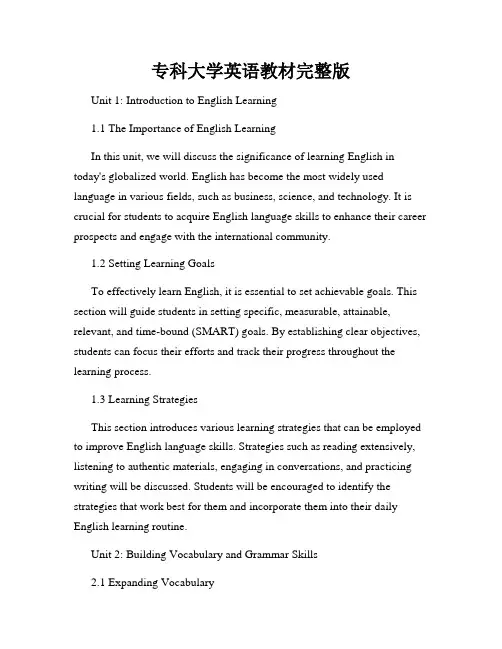
专科大学英语教材完整版Unit 1: Introduction to English Learning1.1 The Importance of English LearningIn this unit, we will discuss the significance of learning English in today's globalized world. English has become the most widely used language in various fields, such as business, science, and technology. It is crucial for students to acquire English language skills to enhance their career prospects and engage with the international community.1.2 Setting Learning GoalsTo effectively learn English, it is essential to set achievable goals. This section will guide students in setting specific, measurable, attainable, relevant, and time-bound (SMART) goals. By establishing clear objectives, students can focus their efforts and track their progress throughout the learning process.1.3 Learning StrategiesThis section introduces various learning strategies that can be employed to improve English language skills. Strategies such as reading extensively, listening to authentic materials, engaging in conversations, and practicing writing will be discussed. Students will be encouraged to identify the strategies that work best for them and incorporate them into their daily English learning routine.Unit 2: Building Vocabulary and Grammar Skills2.1 Expanding VocabularyIn this unit, students will learn effective strategies to expand their English vocabulary. It includes techniques such as reading extensively, using context clues, creating word associations, and utilizing online resources. Furthermore, students will be introduced to essential vocabulary related to common topics, such as education, travel, and technology.2.2 Understanding Grammar StructuresThis section focuses on the basic grammatical structures in English. Students will learn about parts of speech, sentence structures, verb tenses, and common grammatical errors to avoid. Through practice exercises, they will develop a solid foundation in English grammar and improve their overall language proficiency.2.3 Vocabulary and Grammar IntegrationThis unit emphasizes the integration of vocabulary and grammar skills. Students will learn how to apply their knowledge of grammar rules to construct grammatically correct sentences and use appropriate vocabulary. Practical exercises and communicative activities will be provided to reinforce their understanding and application of vocabulary and grammar in real-life situations.Unit 3: Developing Listening and Speaking Skills3.1 Improving Listening ComprehensionIn this unit, students will enhance their listening skills by engaging with various audio materials, such as dialogues, interviews, and speeches. They will practice active listening techniques, note-taking, and understanding different accents and intonations. Furthermore, strategies to improvelistening comprehension, such as predicting, summarizing, and inferring information, will be discussed.3.2 Enhancing Speaking FluencyThis section focuses on developing students' speaking fluency and accuracy. Through interactive speaking activities, such as role-plays, debates, and presentations, students will improve their spoken English skills. Emphasis will be placed on pronunciation, intonation, and effective communication strategies.3.3 Oral Communication in Real-life SituationsThis unit will provide opportunities for students to use their listening and speaking skills in real-life situations. They will engage in simulations of everyday conversations, such as ordering food in a restaurant, making phone calls, and participating in group discussions. Students will also learn effective strategies for overcoming communication barriers and developing cultural awareness.Unit 4: Reading and Writing Skills4.1 Developing Reading ComprehensionIn this unit, students will enhance their reading comprehension skills through a variety of authentic texts, such as newspaper articles, short stories, and academic passages. They will learn strategies to effectively skim, scan, and comprehend the main ideas and supporting details. Additionally, vocabulary expansion and inference skills will be emphasized.4.2 Enhancing Writing SkillsThis section focuses on improving students' writing skills in English. It covers different types of writing, including narratives, descriptive essays, argumentative essays, and formal letters. Students will learn how to structure their writing, develop coherent paragraphs, and effectively express their ideas. Furthermore, grammar and vocabulary usage in writing will be emphasized.4.3 Writing for Academic PurposesIn this unit, students will learn academic writing skills required for further studies. They will understand the structure of essays, research papers, and reports. Emphasis will be placed on critical thinking, conducting research, citing sources, and presenting arguments in an academic context.Conclusion:The comprehensive English textbook for specialized colleges provides a systematic approach to learning the English language. It covers the key aspects of English learning, including vocabulary, grammar, listening, speaking, reading, and writing skills. By following the content and engaging in the practice exercises, students will develop their language proficiency and achieve their learning goals.。
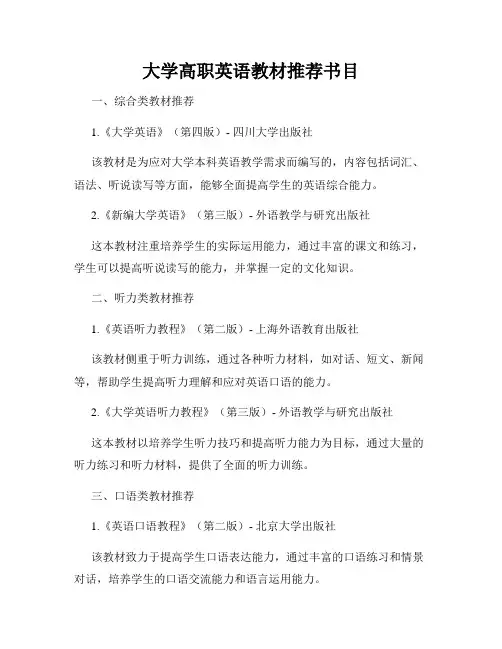
大学高职英语教材推荐书目一、综合类教材推荐1.《大学英语》(第四版)- 四川大学出版社该教材是为应对大学本科英语教学需求而编写的,内容包括词汇、语法、听说读写等方面,能够全面提高学生的英语综合能力。
2.《新编大学英语》(第三版)- 外语教学与研究出版社这本教材注重培养学生的实际运用能力,通过丰富的课文和练习,学生可以提高听说读写的能力,并掌握一定的文化知识。
二、听力类教材推荐1.《英语听力教程》(第二版)- 上海外语教育出版社该教材侧重于听力训练,通过各种听力材料,如对话、短文、新闻等,帮助学生提高听力理解和应对英语口语的能力。
2.《大学英语听力教程》(第三版)- 外语教学与研究出版社这本教材以培养学生听力技巧和提高听力能力为目标,通过大量的听力练习和听力材料,提供了全面的听力训练。
三、口语类教材推荐1.《英语口语教程》(第二版)- 北京大学出版社该教材致力于提高学生口语表达能力,通过丰富的口语练习和情景对话,培养学生的口语交流能力和语言运用能力。
2.《大学英语口语教程》(第三版)- 上海外语教育出版社这本教材主要针对大学生英语口语的培养,通过多样化的口语练习和话题讨论,帮助学生提高英语口语水平和自信心。
四、阅读类教材推荐1.《英语阅读与翻译教程》(第四版)- 外语教学与研究出版社该教材通过精选的英文文章和练习题,培养学生的阅读理解和翻译能力,并注重培养学生的跨文化交际能力。
2.《大学英语阅读教程》(第三版)- 上海外语教育出版社这本教材精心编写了一系列阅读材料,包括科技、文学、历史等多个领域的文章,旨在提高学生的阅读能力和扩展词汇量。
五、写作类教材推荐1.《英语写作教程》(第三版)- 北京大学出版社该教材以培养学生的写作技巧和提高写作水平为目标,通过各种写作练习和范文,帮助学生掌握英语写作的基本要素和结构。
2.《大学英语写作教程》(第二版)- 上海外语教育出版社这本教材注重培养学生写作的能力和思维逻辑,通过各种写作题目和实例,帮助学生提高写作技巧和表达能力。
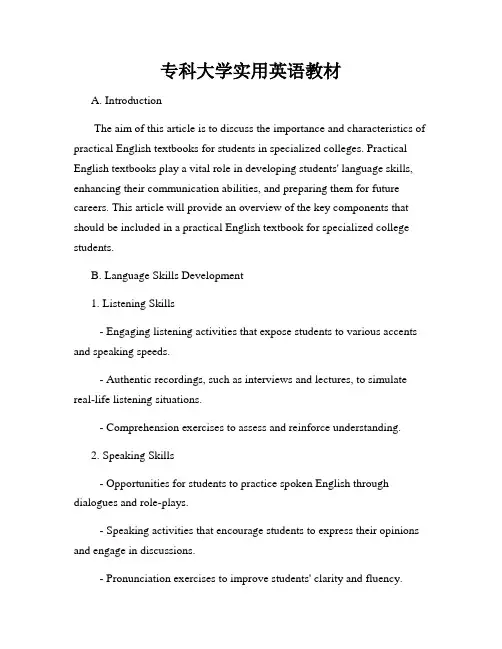
专科大学实用英语教材A. IntroductionThe aim of this article is to discuss the importance and characteristics of practical English textbooks for students in specialized colleges. Practical English textbooks play a vital role in developing students' language skills, enhancing their communication abilities, and preparing them for future careers. This article will provide an overview of the key components that should be included in a practical English textbook for specialized college students.B. Language Skills Development1. Listening Skills- Engaging listening activities that expose students to various accents and speaking speeds.- Authentic recordings, such as interviews and lectures, to simulate real-life listening situations.- Comprehension exercises to assess and reinforce understanding.2. Speaking Skills- Opportunities for students to practice spoken English through dialogues and role-plays.- Speaking activities that encourage students to express their opinions and engage in discussions.- Pronunciation exercises to improve students' clarity and fluency.3. Reading Skills- Graded reading passages that correspond to students' language proficiency levels.- Vocabulary exercises to expand students' word bank and reinforce comprehension.- Text-based activities to develop critical thinking and reading strategies.4. Writing Skills- Step-by-step writing guides that cover different genres, such as essays, reports, and emails.- Grammar and sentence structure exercises to improve written accuracy.- Peer review and revision tasks to promote effective editing and proofreading skills.C. Communication Skills1. Everyday English- Practical language expressions and phrases used in daily conversations.- Situational dialogues that provide examples of real-life communication scenarios.- Role-plays and pair-work activities to encourage active participation.2. Business English- Vocabulary related to business, finance, and international trade.- Business correspondence samples, such as emails, memos, and reports.- Business case studies and discussions to develop business communication skills.D. Cultural Awareness1. Cultural Notes- Insights into different English-speaking cultures and customs.- Discussions on cultural differences and similarities to promote cross-cultural understanding.- Exposure to authentic materials, such as films, music, and literature, from English-speaking countries.2. Intercultural Communication- Activities that encourage students to interact with classmates from different cultural backgrounds.- Group projects that explore cultural topics, fostering cultural sensitivity and appreciation.E. Language Assessment1. Progress Tests- Regular assessments to measure students' language development.- Various question types, including multiple-choice, fill-in-the-blanks, and short answer questions.- Answer keys and explanations for self-evaluation.2. Marking Criteria- Clear guidelines for teachers and students to assess writing and speaking tasks.- Rubrics that assess language accuracy, fluency, coherence, and organization.F. ConclusionIn conclusion, a practical English textbook for specialized college students should cover all four language skills (listening, speaking, reading, writing), communication skills, cultural awareness, and provide adequate language assessment tools. By incorporating these components effectively, students can develop their language competence, enhance their communication abilities, and acquire the necessary language skills for their future career endeavors.。
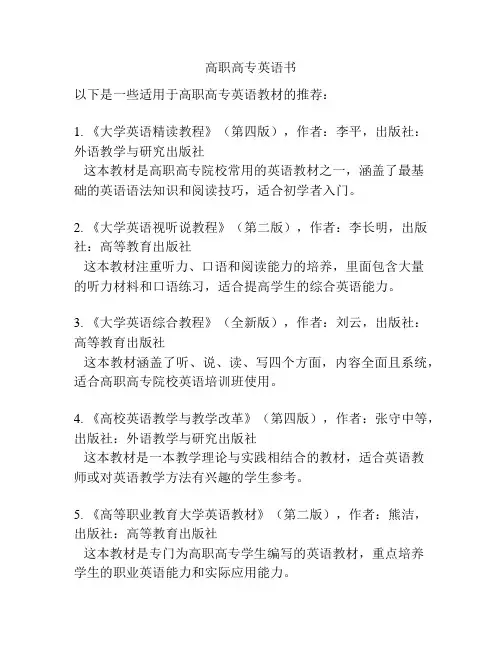
高职高专英语书
以下是一些适用于高职高专英语教材的推荐:
1. 《大学英语精读教程》(第四版),作者:李平,出版社:外语教学与研究出版社
这本教材是高职高专院校常用的英语教材之一,涵盖了最基
础的英语语法知识和阅读技巧,适合初学者入门。
2. 《大学英语视听说教程》(第二版),作者:李长明,出版社:高等教育出版社
这本教材注重听力、口语和阅读能力的培养,里面包含大量
的听力材料和口语练习,适合提高学生的综合英语能力。
3. 《大学英语综合教程》(全新版),作者:刘云,出版社:高等教育出版社
这本教材涵盖了听、说、读、写四个方面,内容全面且系统,适合高职高专院校英语培训班使用。
4. 《高校英语教学与教学改革》(第四版),作者:张守中等,出版社:外语教学与研究出版社
这本教材是一本教学理论与实践相结合的教材,适合英语教
师或对英语教学方法有兴趣的学生参考。
5. 《高等职业教育大学英语教材》(第二版),作者:熊洁,出版社:高等教育出版社
这本教材是专门为高职高专学生编写的英语教材,重点培养
学生的职业英语能力和实际应用能力。
以上是一些适合高职高专院校的英语教材推荐,根据教学内容和学生需求的不同,可以选择适合自己的教材进行学习和教学。
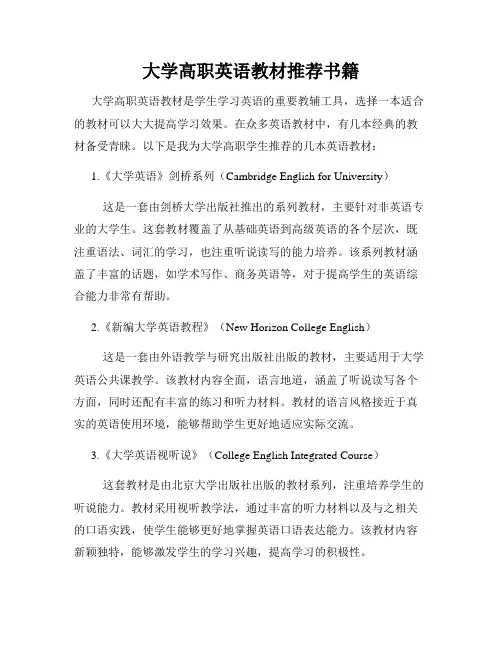
大学高职英语教材推荐书籍大学高职英语教材是学生学习英语的重要教辅工具,选择一本适合的教材可以大大提高学习效果。
在众多英语教材中,有几本经典的教材备受青睐。
以下是我为大学高职学生推荐的几本英语教材:1.《大学英语》剑桥系列(Cambridge English for University)这是一套由剑桥大学出版社推出的系列教材,主要针对非英语专业的大学生。
这套教材覆盖了从基础英语到高级英语的各个层次,既注重语法、词汇的学习,也注重听说读写的能力培养。
该系列教材涵盖了丰富的话题,如学术写作、商务英语等,对于提高学生的英语综合能力非常有帮助。
2.《新编大学英语教程》(New Horizon College English)这是一套由外语教学与研究出版社出版的教材,主要适用于大学英语公共课教学。
该教材内容全面,语言地道,涵盖了听说读写各个方面,同时还配有丰富的练习和听力材料。
教材的语言风格接近于真实的英语使用环境,能够帮助学生更好地适应实际交流。
3.《大学英语视听说》(College English Integrated Course)这套教材是由北京大学出版社出版的教材系列,注重培养学生的听说能力。
教材采用视听教学法,通过丰富的听力材料以及与之相关的口语实践,使学生能够更好地掌握英语口语表达能力。
该教材内容新颖独特,能够激发学生的学习兴趣,提高学习的积极性。
4.《大学英语综合教程》(College English Integrated Course)这套教材由人民教育出版社出版,是针对大学本科非英语专业本科生编写的一套教材。
教材在整体设计上注重“综合”二字,既注重知识点的学习,又注重语言技能的综合运用。
通过一系列任务和练习,能够锻炼学生的听说读写能力,并培养学生的学习策略。
总的来说,选择一本合适的大学高职英语教材对于学生的英语学习至关重要。
以上推荐的几本教材经过多年的教育实践,得到了广大学生和教师的认可。
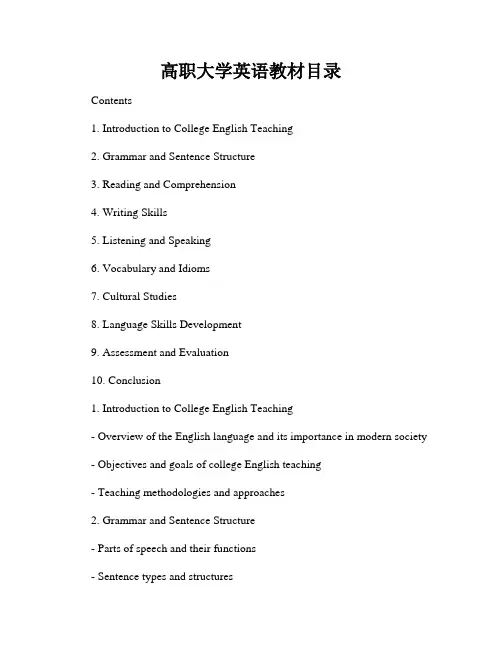
高职大学英语教材目录Contents1. Introduction to College English Teaching2. Grammar and Sentence Structure3. Reading and Comprehension4. Writing Skills5. Listening and Speaking6. Vocabulary and Idioms7. Cultural Studies8. Language Skills Development9. Assessment and Evaluation10. Conclusion1. Introduction to College English Teaching- Overview of the English language and its importance in modern society - Objectives and goals of college English teaching- Teaching methodologies and approaches2. Grammar and Sentence Structure- Parts of speech and their functions- Sentence types and structures- Verb tenses and usages- Subject-verb agreement and other grammatical rules3. Reading and Comprehension- Strategies for effective reading- Skimming and scanning techniques- Comprehension skills such as inference, deduction, and interpretation- Reading and analyzing different types of texts (articles, essays, short stories, etc.)4. Writing Skills- Fundamentals of academic writing- Essay organization and structure- Thesis statement and supporting arguments- Proper citation and referencing- Writing different types of essays, including argumentative, descriptive, and narrative5. Listening and Speaking- Developing listening skills through audio materials and real-life conversations- Strategies for effective listening comprehension- Speaking skills development through role-plays, discussions, and presentations- Pronunciation and intonation practice6. Vocabulary and Idioms- Building a strong vocabulary base- Learning idiomatic expressions and phrasal verbs- Contextual usage of words and collocations- Vocabulary expansion through reading and listening7. Cultural Studies- Understanding cultural diversity and its impact on communication- Exploring different cultures and their customs- Cross-cultural communication skills- Cultural sensitivity and competence in language learning8. Language Skills Development- Integrated skills development through task-based activities- Enhancing reading, writing, listening, and speaking skills simultaneously- Collaborative learning and group projects- Role of technology in language learning9. Assessment and Evaluation- Various assessment methods (tests, quizzes, projects, presentations)- Formative and summative evaluation techniques- Feedback and error correction- Assessing language proficiency and progress10. Conclusion- Importance of college English education for students' future careers- Summary of topics covered in the textbook- Encouragement for continuous language learning beyond the classroomThe above contents provide a comprehensive outline of the topics covered in a college-level English teaching textbook. The inclusion of these topics ensures that students develop a solid foundation in grammar, reading, writing, listening, speaking, vocabulary, cultural studies, and language skills development. The textbook aims to equip students with the necessary language proficiency for academic and professional success in English-speaking environments.。
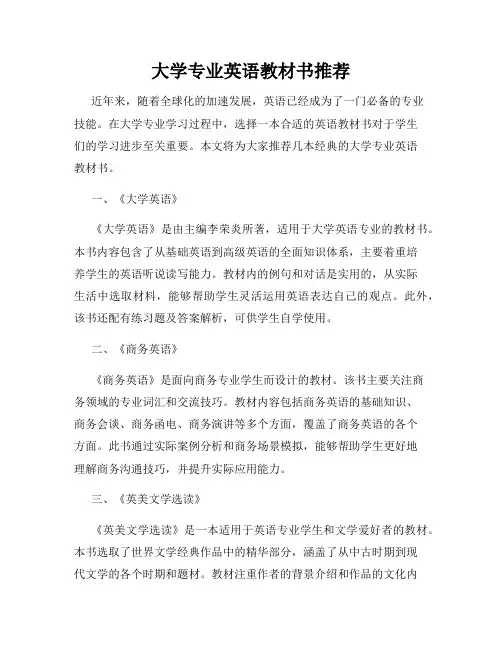
大学专业英语教材书推荐近年来,随着全球化的加速发展,英语已经成为了一门必备的专业技能。
在大学专业学习过程中,选择一本合适的英语教材书对于学生们的学习进步至关重要。
本文将为大家推荐几本经典的大学专业英语教材书。
一、《大学英语》《大学英语》是由主编李荣炎所著,适用于大学英语专业的教材书。
本书内容包含了从基础英语到高级英语的全面知识体系,主要着重培养学生的英语听说读写能力。
教材内的例句和对话是实用的,从实际生活中选取材料,能够帮助学生灵活运用英语表达自己的观点。
此外,该书还配有练习题及答案解析,可供学生自学使用。
二、《商务英语》《商务英语》是面向商务专业学生而设计的教材。
该书主要关注商务领域的专业词汇和交流技巧。
教材内容包括商务英语的基础知识、商务会谈、商务函电、商务演讲等多个方面,覆盖了商务英语的各个方面。
此书通过实际案例分析和商务场景模拟,能够帮助学生更好地理解商务沟通技巧,并提升实际应用能力。
三、《英美文学选读》《英美文学选读》是一本适用于英语专业学生和文学爱好者的教材。
本书选取了世界文学经典作品中的精华部分,涵盖了从中古时期到现代文学的各个时期和题材。
教材注重作者的背景介绍和作品的文化内涵,对于深入理解英美文学的发展和特点非常有帮助。
此外,教材还包含了详细的分析和讨论问题,可以帮助学生拓展思维,提高专业素养。
四、《英语写作与翻译》《英语写作与翻译》是一本专注于提高学生英语写作和翻译能力的教材。
书中包含了大量的写作和翻译实例,同时给出了具体的写作要点和常用表达方式。
教材还以综合性的项目作业形式出现,帮助学生熟悉真实工作场景中的英语写作和翻译任务。
通过不断的实践和反馈,学生可以逐步提高自己的表达能力和专业素养。
总结起来,针对大学专业英语学习,选择一本合适的教材书非常重要。
本文推荐了几本经典的教材,包括《大学英语》、《商务英语》、《英美文学选读》和《英语写作与翻译》。
这些教材内容全面,涵盖了不同专业的英语学习需求,并提供了实用的例句、练习题及答案解析,能够帮助学生掌握英语听说读写等各个方面的技能。
河南专科大学英语教材IntroductionThe English textbook used at Henan Vocational College provides a comprehensive and effective approach to learning the English language. This article aims to explore the various aspects of the textbook, including its content, organization, and teaching methods. Through a detailed analysis, we can understand the benefits of using this textbook and how it contributes to the overall English learning experience at Henan Vocational College.ContentThe English textbook at Henan Vocational College covers a wide range of topics, ensuring that students are exposed to various aspects of the language. It includes lessons on grammar, vocabulary, reading comprehension, listening skills, writing, and speaking. Each chapter focuses on a specific theme or skill, allowing students to develop a well-rounded understanding of the English language.The content is carefully selected to align with the learning objectives of the English program. It starts with basic grammar rules and gradually progresses to more advanced topics. The vocabulary is also carefully chosen to introduce students to words and phrases commonly used in everyday communication.OrganizationThe textbook is organized in a logical and systematic manner. Each chapter begins with an introduction to the theme or topic, providing studentswith a brief overview of what they will learn. This helps students to mentally prepare themselves and develop an understanding of the context.Within each chapter, the content is divided into smaller sections, allowing for a step-by-step approach to learning. This helps students to grasp new concepts more easily and reinforces their understanding. Additionally, the textbook incorporates exercises and activities at the end of each section, providing students with opportunities to practice and apply what they have learned.Teaching MethodsThe teaching methods used in the English textbook at Henan Vocational College are diverse and engaging. The textbook adopts a communicative approach, encouraging students to actively participate in the learning process. It provides ample opportunities for students to practice their listening, speaking, reading, and writing skills.The textbook also incorporates multimedia resources, including audio recordings and online platforms, to enhance the learning experience further. These resources allow students to listen to native speakers, practice pronunciation, and access additional materials for self-study.The Role of the TextbookThe English textbook at Henan Vocational College plays a crucial role in the overall English learning experience of students. It serves as a guide and reference for both students and teachers, providing a structured framework for the language curriculum. The textbook facilitates a progressive learning process, ensuring that students develop a solid foundation in English.Furthermore, the textbook serves as a platform for interactive learning. It encourages students to actively engage with the content and apply their knowledge in real-life situations. Through the use of interactive exercises and activities, students are motivated to practice and improve their language skills.ConclusionThe English textbook used at Henan Vocational College is a valuable resource for students in their English language learning journey. Its comprehensive content, organized structure, and engaging teaching methods contribute to the overall success of the English program. Students are provided with ample opportunities to develop their language skills and achieve fluency. By utilizing this textbook effectively, students at Henan Vocational College can enhance their English proficiency and become confident communicators in the global community.。
牙医大专推荐大学英语教材大专学院的牙医专业是培养和训练口腔医疗技术人员的重要渠道。
随着社会的发展和国际交流的增加,英语作为一种国际通用语言,对于牙医学生的学习和职业发展起着至关重要的作用。
因此,选择合适的大学英语教材对牙医学生的学习具有重要意义。
一、综合英语教材对于牙医专业的学生来说,综合英语教材是打基础的重要选择。
综合英语教材通常会涵盖语法、词汇、听力、口语和写作等方面的内容,能够全面提升学生的英语综合运用能力。
1.《大学英语》《大学英语》是一套经典的综合英语教材,广泛应用于国内高校。
该教材分为四个级别,适合不同层次的学生使用。
其中包含大量的例句、语法解析和练习题,能够帮助学生巩固英语基础,提高阅读和写作能力。
2.《新编大学英语》《新编大学英语》是另一套常用的综合英语教材,也分为四个级别。
教材内容较为贴近实际生活和职业需求,涵盖了丰富的听力材料和口语练习,有助于培养学生的沟通能力和交际技巧。
二、医学英语教材由于牙医专业的特殊性,医学英语教材可以更有针对性地帮助学生掌握与口腔医疗相关的专业词汇和知识。
1.《医学英语》《医学英语》是一本专门针对医学类专业学生编写的英语教材,内容涵盖了各个医学领域的词汇和概念,并提供了相关的例句和练习。
对于牙医学生来说,这本教材是学习医学英语的宝贵工具。
2.《口腔医学英语》《口腔医学英语》是一本针对口腔医学专业学生设计的英语教材,内容包括口腔解剖学、牙科材料学、种植学等具体领域的英语表达。
通过学习这本教材,牙医学生可以更准确地理解和运用口腔医学英语。
三、英语专业教材如果牙医大专学生打算将来从事与英语相关的工作,英语专业教材则是他们不可或缺的选择。
1.《英语专业导论》《英语专业导论》是培养英语专业学生综合素质的教材,内容涵盖了英语语言学、翻译学、文学与文化等方面的知识。
这本教材能够帮助学生了解英语专业的基本概念和发展趋势,为以后深入学习打下坚实基础。
2.《英语写作》《英语写作》是针对学习英语专业写作技巧的学生而设计的教材,内容包括写作理论、写作技巧和范文欣赏。
流行的大学英语教材大学英语是中国大陆许多学生备考四六级、参加英语专业考试甚至是出国留学的必修课程。
而选择一本流行的大学英语教材对于学生的学习效果至关重要。
本文将介绍几本备受青睐的大学英语教材,并对其内容和特点进行评述。
1. 《新编大学英语》(第三版)《新编大学英语》(第三版)是近年来最流行的大学英语教材之一。
该教材分为四册,分别涵盖了大学英语四级和六级的全部考试内容。
其内容涉及词汇、语法、听力、阅读等多个方面,结构严谨,内容丰富。
每个单元都配有详细的课文、习题和听力材料,通过多种学习资源提供全面的语言训练。
此外,教材还融入了一些文化背景知识和实际应用场景,使学生在学习语言的同时了解英语国家的文化和风俗。
2. 《大学英语新视野》(第三版)《大学英语新视野》(第三版)是另一本备受欢迎的大学英语教材。
该教材也分为四册,分别适用于英语四级和六级的学习。
与传统教材相比,该系列教材更加注重培养学生的综合语言运用能力。
每个单元都通过引人入胜的文章和多样化的练习来帮助学生提高听说读写的技能。
此外,该教材还包含了大量的实践性教学活动,帮助学生将所学知识运用到实际场景中去。
3. 《剑桥商务英语》《剑桥商务英语》是专为商务人士和从事商务英语学习的学生设计的教材。
该教材内容丰富全面,旨在提高学生在商业环境下的英语运用能力。
从商务场景、职场技巧、商业语言等多个方面进行了系统的阐述和训练。
教材中的案例研究和实际商务文件的分析也有助于学生理解和掌握商务英语的实际运用。
不仅适用于大学英语教学,也可供从事商务工作的人士进行自学和提高。
4. 《大学英语语法教程》《大学英语语法教程》是一本针对英语语法学习的专业教材。
该教材详细介绍了英语的基本语法知识,涵盖了词类、句子结构、语法规则等多个方面。
通过讲解和练习,帮助学生掌握和应用英语语法,提高语言表达的准确性和流利度。
该教材的特点是简洁明了,注重实用性,非常适合需要系统学习和巩固英语语法的学生。
大学学英语教材推荐英语作为一门重要的国际通用语言,在大学学习中扮演了不可或缺的角色。
选择一本适合自己的英语教材,对于提高英语水平和学习效果至关重要。
在众多的英语教材中,有几本经典的教材备受青睐。
本文将为大家推荐几本备受认可的大学英语教材。
第一本推荐的是《大学英语(第四版)》。
这是一本经典的教材,被广大教师和学生普遍认可。
这本教材由国内一流的大学英语教育专家编写,内容丰富全面。
教材分为四册,覆盖了从大学英语入门到高级应用阶段的各个方面。
每册内容紧扣这个阶段的学习目标,同时兼顾了听说读写四个技能的培养。
此外,教材还附带了大量的教学资源,包括录音材料、练习册等,可以帮助学生更好地巩固知识。
第二本推荐的是《中级英语语法与修辞》。
作为一本针对中级英语学习的教材,它的特点是注重对语法和修辞的深入解读。
通过对英语语法的系统梳理和对修辞的精细分析,学生可以在词汇和语法应用方面更加游刃有余。
教材布局合理,知识点丰富,既包含了基础的语法知识,也涵盖了一些高级语法和修辞技巧。
同时,教材还提供了大量的例句和练习题,可以帮助学生更好地理解和运用所学知识。
第三本推荐的是《商务英语教程(第三版)》。
随着全球化的发展,商务领域的英语需求越来越高。
这本教材以商务英语为重点,将商务沟通技巧和商业实践相结合。
教材内容涵盖了商务工作中常见的场景和对话,包括会议、商务信函、商务谈判等。
教材注重培养学生的实际应用能力,通过大量的案例分析和角色扮演,让学生在模拟的商务环境中提高自己的语言水平和沟通技巧。
最后一本推荐的是《英语阅读与翻译(第三版)》。
阅读是提高英语水平的重要途径之一,这本教材的目的就是培养学生的阅读能力和翻译能力。
教材内容包括了各种主题的英文文章,涵盖了社会、文化、科技、经济等多个领域。
文章难度逐渐增加,学生可以逐步提升自己的阅读水平。
同时,教材还提供了许多翻译练习,可以帮助学生培养从英文到汉文的翻译技巧。
以上是我为大家推荐的几本备受认可的大学英语教材。
大学生推荐的学习英语教材在当今全球化的时代,掌握一门国际语言,特别是英语,对于大学生来说至关重要。
英语不仅是沟通交流的重要工具,还是获取国际信息和参与国际竞争的必备技能。
然而,随着市面上各式各样的英语教材琳琅满目,作为一名大学生,如何选择适合自己的学习英语教材是一个重要的问题。
在本文中,将介绍几本大学生推荐的学习英语教材,帮助学习者有效提升英语水平。
首先,推荐《新编大学英语》系列教材。
这套教材由外语教学与研究出版社出版,已经成为中国大学英语专业教材的代表性教材之一。
该系列教材分为四级,从基础到高级,内容系统,涵盖了从词汇、语法到听力、口语和阅读等各个方面的能力培养。
教材中的练习题目涉及实际场景和生活情境,有助于学习者在实践中提升语言运用能力。
此外,教材还配有在线资源和辅助学习材料,供学习者进行自主学习和巩固知识。
其次,推荐《剑桥商务英语》系列教材。
这套教材适用于有商务英语需求的大学生。
作为国际商务交流的重要语言,学习商务英语可以帮助学生在未来的职业发展中更具竞争力。
《剑桥商务英语》系列教材分为初级、中级和高级,内容针对商务交际和商务写作方面进行了系统的讲解和练习。
教材中的案例和实践活动将学习者置于真实商务场景中,帮助他们更好地理解和运用商务英语。
此外,推荐《新概念英语》系列教材。
这套教材是一本经典的英语教材,适合英语基础较薄弱的学习者。
《新概念英语》系列教材从基础的词汇和语法开始,通过精心编排的文章和练习,循序渐进地提高学习者的听、说、读、写技能。
教材中的文章涉及社会、文化、历史等方面的内容,不仅帮助学习者提高语言能力,同时也拓宽他们的知识面。
最后,推荐《英语流利说》教材。
这是一本以口语训练为主的教材,适合那些希望提高口语表达能力的学习者。
《英语流利说》教材以日常生活为背景,通过对话和口语训练,帮助学习者学会运用英语进行日常交流。
教材中的练习题目有针对性地训练学习者的口语流利度和表达准确性,同时也注重培养学习者的听力理解能力。
专科大学英语教材第二版
专科大学英语教材第二版是一本旨在提高专科大学学生英语水平的
教材。
该教材经过精心编写,旨在培养学生的英语听、说、读、写能力,帮助学生快速掌握英语语言技巧,进一步提高综合运用英语的能力。
本教材的特点之一是内容全面。
它涵盖了从基础到进阶的各个语言
技能,在每个单元中都设有听力、口语、阅读和写作的练习。
这样可
以帮助学生全面提高英语能力,并逐步培养他们的语感和语言组织能力。
另一个特点是贴近实际应用。
教材中的练习题和对话场景都是真实
生活中常见的,如购物、旅行、工作等。
学生在练习中可以模拟真实
情境进行英语交流,提高实际运用英语的能力。
此外,本教材注重学习方法的培养。
每个单元都提供了学习策略的
提示和学习技巧的训练,帮助学生掌握更好的学习方法,提高学习效果。
教材还配有听力材料和相关的练习题,学生可以通过反复听与做
题的方式提高听力技能。
教材中还包含了丰富的扩展资源,如配套练习册、听力练习音频等,以帮助学生更好地巩固所学知识。
同时,教材中也提供了课堂活动建
议和学习目标,帮助教师更好地教授该教材,并促进学生的参与度和
积极性。
总之,专科大学英语教材第二版是一本内容全面、实用性强的教材。
它将从基础到进阶的英语知识有机地结合在一起,旨在帮助专科大学
学生快速提高英语水平,为他们今后的学习和工作打下坚实的英语基础。
学生们通过学习该教材可以更好地掌握英语语言技巧,提高综合
运用英语的能力,让英语成为他们的得力工具。
大专院校常用大学英语教材
大专院校的英语教育在培养学生的英语能力和应对国际交流中的角
色日益重要。
大学英语教材被广泛应用于大专院校的英语教学中,为
学生提供了系统和全面的英语学习资源。
本文将介绍几种常用的大学
英语教材。
一、《新标准大学英语》
《新标准大学英语》是大专院校中最常用的教材之一。
它以培养学
生英语综合运用能力为目标,内容涵盖了听、说、读、写等各个方面。
这套教材分为四个级别,从基础入门到高级应用都有相应的教材。
教
材中的内容丰富多样,包括了各种主题的对话、阅读材料和写作练习,能够满足学生不同层次的学习需求。
二、《大学英语》
《大学英语》是另一套常用的大学英语教材。
它以培养学生的交际
能力和语言运用能力为重点,注重培养学生的听力和口语表达能力。
这套教材的特点是内容紧凑,重点突出,通过大量的听力材料和口语
练习,帮助学生提高英语的应用能力。
教材中还包括了一些专业领域
的学术英语,有利于学生在日后的学习中更好地理解和阐述专业知识。
三、《大学英语精读》
《大学英语精读》是一本面向大专院校的阅读教材。
它选取了一系
列高质量的英文原版文章,内容丰富多样,包括社会、历史、文化等
各个方面。
这本教材的特点是注重培养学生的阅读理解能力和批判思
维能力,通过对文章的深入分析和讨论,培养学生独立思考和批判性思维的能力。
四、《大学英语听力》
《大学英语听力》是一本专注于听力训练的教材。
它选取了各种场景的听力材料,包括对话、讲座、新闻等,帮助学生提高听力理解和口语表达能力。
教材中的练习形式多样,有听力填空、听力选择和听力短文理解等,能够满足学生的不同训练需求。
五、《大学英语写作》
《大学英语写作》是以培养学生写作能力为主要目标的教材。
它涵盖了英语写作的各个方面,包括写作技巧、写作结构、语法修辞等。
通过大量的写作练习和范文分析,帮助学生提高自己的写作水平,培养学术论文写作和文章写作的能力。
总之,大专院校常用的大学英语教材涵盖了听、说、读、写等各个方面的英语技能,并注重培养学生的交际能力和语言运用能力。
这些教材通过多样化的练习形式和丰富的学习资源,帮助学生全面提高自己的英语水平。
无论是在学术研究上还是在国际交流中,这些教材都能为学生提供有力的支持和帮助。
大专院校的英语教育将持续发展,英语教材的优化和更新也将是一个不断探索的过程。